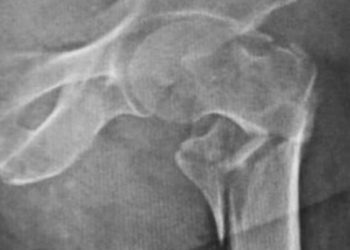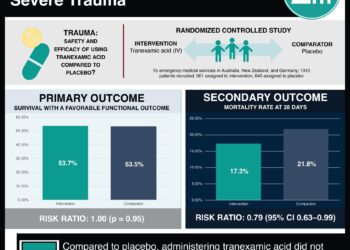Prophylactic tranexamic acid for decreased hysterectomy blood loss
1. Women who received tranexamic acid before benign hysterectomy experienced less blood loss compared to placebo.
2. No serious adverse events, including blood clots or death, were seen in the intervention group.
Evidence Rating Level: 1 (Excellent)
Study Rundown: Hysterectomy is one of the most common surgical procedures performed in the United States, where over half a million are performed each year. Even when performed for benign indications, such as fibroids or abnormal uterine bleeding, hysterectomy comes with risks. The most common complications of hysterectomy are related to intraoperative and perioperative blood loss. Tranexamic acid is an anti-fibrinolytic agent that blocks fibrin degradation, thereby promoting blood clot formation. Tranexamic acid has been shown to effectively reduce bleeding complications in many surgical and medical areas, and can be used both prophylactically and therapeutically. However, few studies have specifically assessed the benefit of tranexamic acid during gynecologic surgery. In this double-blinded randomized placebo-controlled trial, researchers investigated the effects of prophylactic treatment with intravenous tranexamic acid on bleeding complications in women undergoing elective, benign hysterectomies.
Women who received prophylactic tranexamic acid had significantly less intraoperative blood loss during hysterectomy compared to women who received a placebo. There were no serious adverse events, including blood clots, observed in the intervention group, although the study was not powered to find a significant difference. Strengths of this study included double-blinded design and a large sample size. Although weighing all used materials before and after surgery is in theory can provide a more objective means of measuring blood loss than surgeon or anesthesiologist’s estimation, many patients were calculated as experiencing negative blood loss, suggesting there may be inaccuracies in this estimation method. However, variability in blood loss estimates would not be expected to vary by randomization arm in a double-blinded trial. Larger studies powered to detect a difference in adverse events and using drop in hemoglobin as an objective measure of intraoperative blood loss would further elucidate the value of tranexamic acid as a prophylactic treatment to reduce blood loss in benign hysterectomies.
Click to read the study in AJOG
Relevant Reading: Anti-fibrinolytic use for minimising perioperative allogeneic blood transfusion [Cochrane Review]
In-Depth [randomized controlled trial]: Women undergoing abdominal, laparoscopic, or vaginal hysterectomies for benign indications were randomized to receive either 1 gram of intravenous tranexamic acid (n = 164) or a placebo (n = 166) at the start of surgery. The primary outcome was intraoperative blood loss, measured subjectively by surgeon estimate and objectively by weighing the difference in all surgical sponges before and after the procedure. Secondary outcomes included intraoperative blood loss ≥1000 mL, ≥500 mL and reoperation due to bleeding complications, among others.
Among women undergoing hysterectomy for benign indications, those randomized to preoperative tranexamic acid experienced less subjectively and objectively measured blood loss compared to placebo (Subjective: 98.4 vs. 134.8 mL, p = 0.006; objective: 100 vs. 166 mL, p = 0.004). Women in the tranexamic acid group were less likely to experience blood loss ≥500 mL (6 vs. 21, p = 0.003) or reoperation due to postoperative bleeding (2 vs. 9, p = 0.03). No adverse events, including thromboembolism or death, were observed in either group.
Image: CC/Wiki/Mk2010
©2015 2 Minute Medicine, Inc. All rights reserved. No works may be reproduced without expressed written consent from 2 Minute Medicine, Inc. Inquire about licensing here. No article should be construed as medical advice and is not intended as such by the authors or by 2 Minute Medicine, Inc.





![Nanoliposome allows for targeted drug delivery to treat pancreatic cancer [PreClinical]](https://www.2minutemedicine.com/wp-content/uploads/2016/02/SolidLipidNanoparticle-75x75.jpg)
